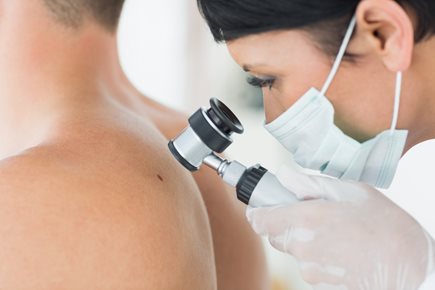Skin Cancers Going Undiagnosed Due to COVID-19
More than a million skin cancers likely went undetected in the U.S. last year, including 19,600 melanomas, skin cancer's deadliest form.
Concerns over the magnitude of COVID-19’s effect on the timely detection and management of melanoma and non-melanoma skin cancers has led an elite team of researchers, including Advanced Dermatology’s own Dr. James Solomon and Dr. Matt Leavitt, to participate in research that has been published in the January 19, 2021 edition of the Journal of the American Academy of Dermatology (JAAD).
Dr. Solomon and Dr. Murray Cotter also participated in a recent study that demonstrated the effectiveness of total-body skin cancer exams, which was published in the Journal of Clinical Oncology®, an American Society of Clinical Oncology (ASCO) Journal.
“Because of the reduced access to medical providers, especially during the early days of the coronavirus (COVID-19), we’ve had concerns that patients with potential skin cancers may have experienced delays in getting checked for skin cancer and in receiving the care they need,” said Dr. Solomon, who is the Director of Research and Principal Investigator of Ameriderm Research, the research division of Advanced Dermatology.
“Our study assessed the magnitude of delays in initial skin cancer diagnosis and management.”
With institutional review board approval, data from January 2019 to August 2020 were analyzed from available outpatient-chart reviews of 143 US dermatology practices (350 providers) covering 4.7 million patients across 13 geographically distributed states. The number of diagnosed cutaneous melanomas, cutaneous squamous cell carcinomas (SCCs), and basal cell carcinomas (BCCs) was determined.
“Total 2020 skin cancer diagnoses trailed that of 2019, with 279 fewer cutaneous melanomas, 6000 fewer cutaneous SCCs, and 9914 fewer BCCs detected,” said Dr. Solomon.
"Extrapolating these findings to the full US population (330 million), an estimated 19,600 cutaneous melanomas, 421,300 cutaneous melanomas, 421,300 cutaneous SCCs, and 696,100 BCCs have likely had delayed initial diagnosis or treatment.
“Although skin cancer diagnoses have now returned to the same-month 2019 baseline, our findings suggest that a large backlog of skin cancers remains undiagnosed. These delays may lead to skin cancers presenting at more advanced stages.”
The ASCO published study explored the effectiveness of dermatology providers performing total-body skin cancer exams versus partial skin exam screenings and concluded that skin cancer is detected at significantly higher rates using total-body skin cancer exams. In fact, it concluded a total-body skin cancer exam is 23.5 times more likely to identify a melanoma than a Pap smear is to identify a cervical cancer.
“The bottom line is that skin cancer didn’t take a break due to COVID-19,” said Dr. Solomon. “If you’re due for your annual total-body skin cancer exam, book it now and get it on your calendar. We’re taking strict safety measures to protect your health so you can have the peace of mind you want to get the care you need.”
Interested in Participating in a Clinical Trial?
To learn more about Ameriderm Research or to inquire about our clinical trials, visit www.AmeridermResearch.com.